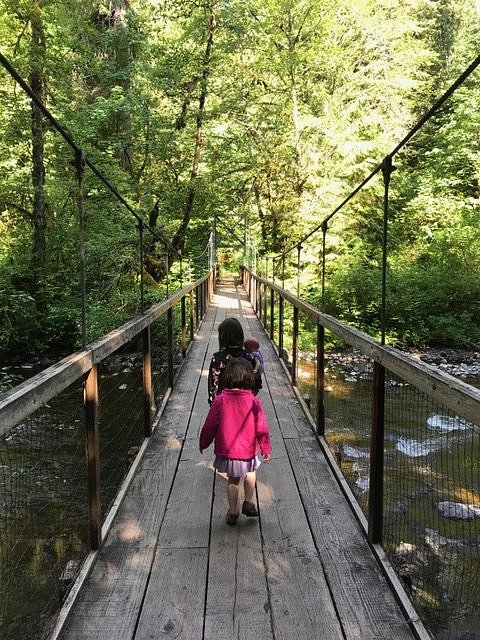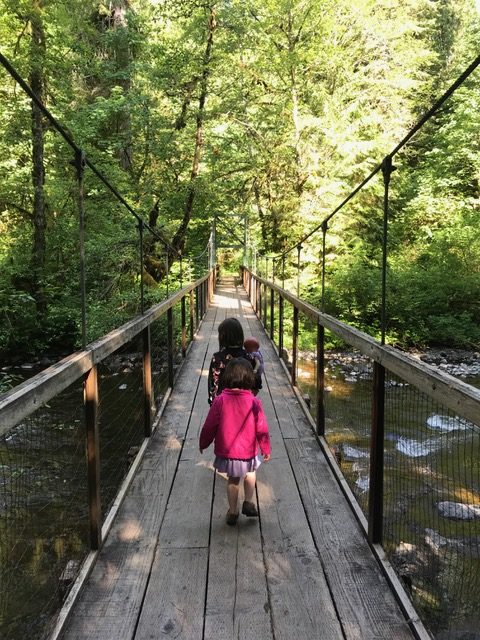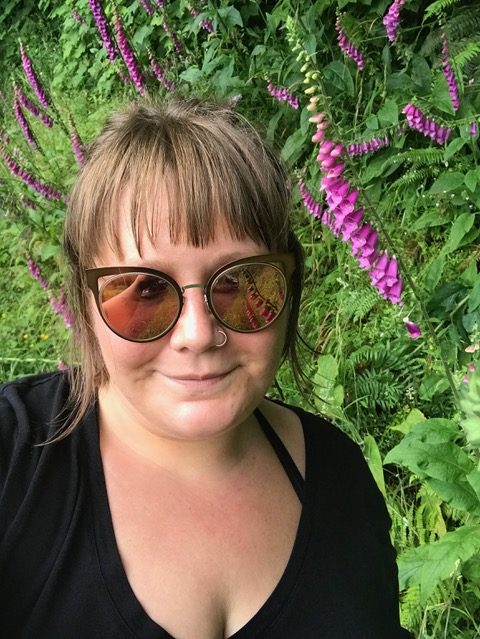HEALING & MOTHERHOOD IN THE OUTDOORS: JULIE E.
There aren’t any exclusive qualifications to becoming an adventurous woman.

Posted on Wed 2 Dec 2020 · by Elle Biesemeyer
There aren’t any exclusive qualifications to becoming an adventurous woman. In the AdventurUs Women community, we all embody an infinite number of identities, experiences, and communities. We don’t have to be Triple Crown thru-hikers or big wave surfers to hold the outdoors as a vital part of our lives. Most often, adventure begins within ourselves and comes when we least expect it. Even during an afternoon at the park. Today we speak with Julie E., a mother of two young girls (5 and 8), a high school English teacher, a somatic therapist-in-training, and, of course, an adventurous woman, about healing and motherhood in the outdoors.
Fording freshly-carved creeks wasn’t on the agenda for Julie and her two daughters when they set out on the trail to their favorite secluded forest nook in Oxbow Park. Torrential, albeit brief, summer storms in Portland easily wash away the thousands of urban trails throughout the city, patched up with logs and wobbly wooden boards. Camp chairs and lunchboxes in hand, the trio came upon one of these precarious crossings. Julie’s eldest daughter nimbly skittered across without a care as her youngest moaned about her fear of getting her pants wet. And for Julie, something didn’t feel right.
Suddenly, the drop from the log to the stream below, only four feet, seemed as deep as the Grand Canyon. The sandy banks holding the fallen tree felt as if they were about to dissolve beneath her feet. “I don’t think I can make it,” she said, petrified. “Is this the moment where my body is going to keep me from keeping my kids safe?” She asked herself.
It wasn’t. Julie’s daughter looked back at her from across the log and told her, “Mom take your time, I’m just gonna be right here.”
Adventure is subjective.
We all have the autonomy to decide what adventure means to us and how we approach it. Yet, there are always external voices that try to make those choices for us. Adventure, to Julie, first comes with a negotiation within ourselves. Trusting our instincts is paramount as women in the outdoors, but how do we discern where our inner voice speaks from?
“The outdoors helps us to find our strength, but it also lets us have weaknesses.”
Staring in her daughter’s eyes from across a log that seemed like a twig over a stream that seemed like rapids, Julie’s intuition was, surprisingly, wrong. Her inner voice was merely an echo of external voices that doubted her.

Julie’s daughters make their way across a not-so-precarious river crossing.
With a joint dislocation disorder, Julie has very real concerns about her body. And part of motherhood in the outdoors demands a safety-first attitude. “But I also have very impactful and persistent expectations about other people’s imaginings of what my body is capable of doing, and sometimes it’s hard to detangle the two inside,” she says. Much of what we internalize about our bodies as fat women is false, made for us to feel ashamed of ourselves.
“My body won’t be able to handle this, certainly what they say is true, I’m going to have a heart attack halfway up the trail and die out here alone,” the voice may say. But we often find ourselves making that external voice our very own.
Julie and her daughters made it to their nook, a riverbank with logs for her youngest to practice walking across and otters swimming near the shore, and all was well. For Julie, moments of transformation like the one at the log crossing are innumerable in the outdoors.
The outdoors as a classroom for life lessons is not a new idea.
It is why AdventurUs Women seeks to build strong communities of women in the outdoors. The outdoors helps us to find our strength, but it also lets us have weaknesses. If we cry on a trek like Nicole Snell did on the Camino Inca, if we huff and puff up a hill like I often do, or if we scream into the depths of the forest, the outdoors does not shame us. There is a certain shameless neutrality to the outdoors that welcomes us unconditionally.
From nature, Julie learns to ‘Receive my kids—their storms of emotions, their desires, how they’re extremely different from me in some ways. To not ask for compliance and cowing to me but to just receive.’
Julie finds this neutrality to make the outdoors a wonderful model of motherhood. From nature, Julie learns to “Receive my kids—their storms of emotions, their desires, how they’re extremely different from me in some ways. To not ask for compliance and cowing to me but to just receive.” Motherhood is not about molding her daughters to her own image but nurturing them to grow into themselves. It is about witnessing her daughters’ self-efficacy and empowering them to trust only their own inner voice.
From these lessons in motherhood, Julie in turn learns to mother herself and heal from trauma.
Nature offers her lessons in acceptance, love, and growth. “Developing a relationship to your own offerings, however dark or shameful they feel, developing a neutral relationship is really essential to overcoming trauma,” she says. The internal work of healing occurs most effectively when in an environment that has no expectations of us. There, we are free to be responsible for our own healing, whatever that entails. We teach ourselves about motherhood in the outdoors–about mothering our children and mothering ourselves.

Julie nestles in a nook of digitalis.
In the outdoors, we learn to trust ourselves and to probe at the murky boundaries of our own internal voice and the external voices that are detrimental to our wellbeing. We have the opportunity to discover the authenticity of our intuition, where it comes from, and how we can strengthen it.
We all need the reminder that we can do hard things, and take our time doing them like Julie’s daughter told her. And as we gain confidence in our internal voice, those hard things get a little easier. Having a cheerleader by our side as we overcome those challenges is ever-important, but at the end of the day, the most empowering voice is the one inside us.